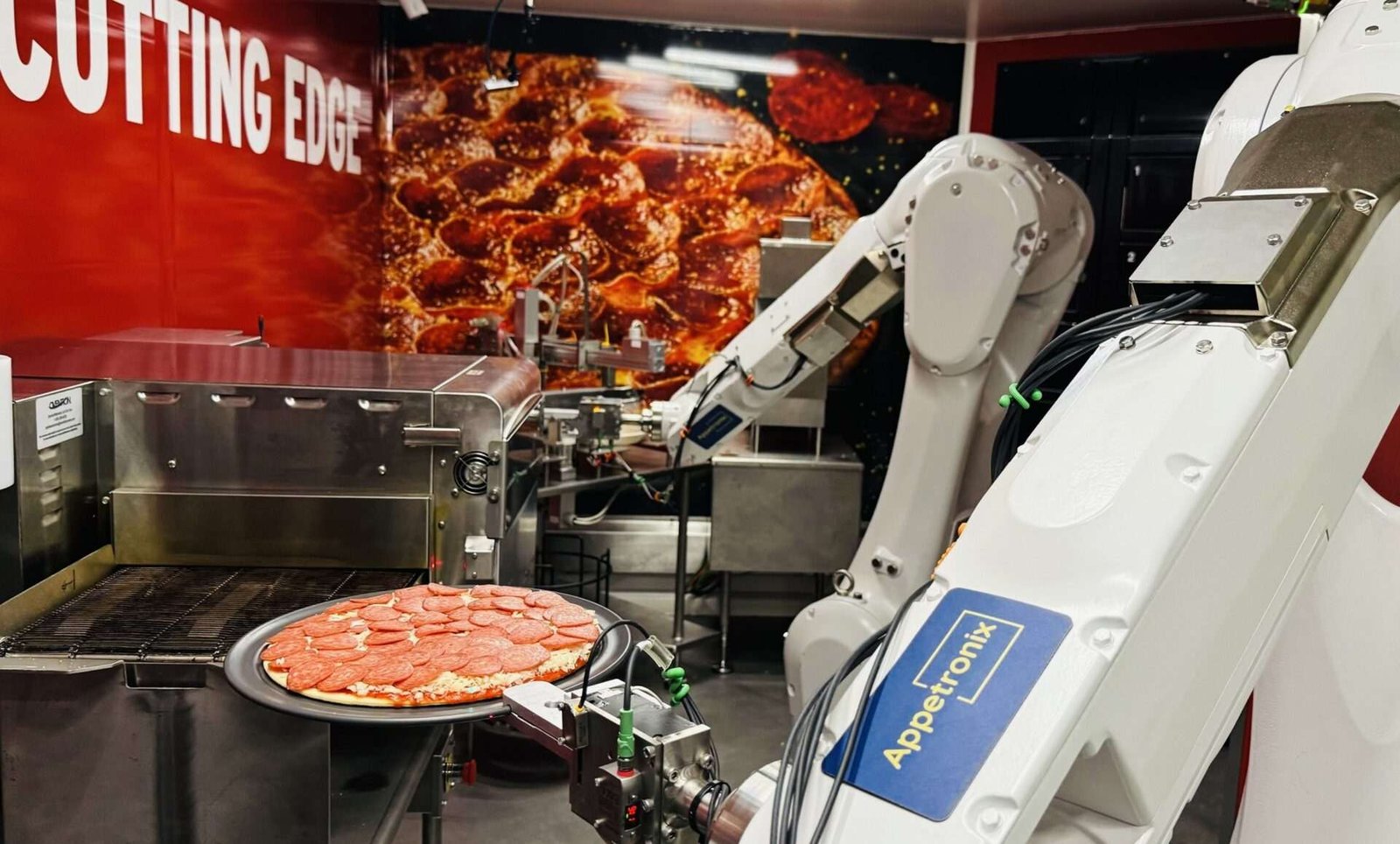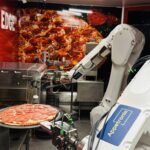- Robotic kitchen startup Appetronix has raised a $6 million seed plus round led by Donatos Pizza founder Jim Grote, the Grote family, and AlleyCorp, taking its total funding to $10 million.
- Founded in 2020 by Nipun Sharma, Appetronix recently launched an automated pizza kitchen at Columbus International Airport with Donatos, a premium pizza chain with 460+ locations across the US.
- The funding will help the Toronto-based firm expand its partnership with Donatos and work with other partners on robotic kitchens that make Asian noodle bowls, Mexican burrito bowls, and cookies round the clock in high-traffic locations from airports and hospitals to entertainment venues, universities, and offices.
Why it matters
Multiple firms have attempted to automate parts of the kitchen in foodservice environments in a bid to cut labor costs, but they rarely achieve meaningful savings, claimed Nipun Sharma, who started his career in investment banking before getting into the restaurant business.
“I think everybody recognizes that foodservice is ripe for disruption,” he told AgFunderNews. “Labor is expensive and hard to find and COVD only accelerated that. So the first generation of companies went out there with robot arms that replicate human movement. They worked to a certain extent but didn’t really make sense from a financial point of view.
“The second-generation companies started making assembly lines in existing restaurants, but putting a big machine inside an existing kitchen is almost impossible.
“I was out there looking for companies in the food robotics and AI space, met a bunch of companies and could not understand their business plan or unit economics, and realized that it doesn’t make sense to retrofit a kitchen or raise millions of dollars [for robots] to flip burgers. You need to start from scratch without thinking about replacing what humans are doing, but how do you most efficiently make the product?
“For us, the inspiration comes more from factories than kitchens. None of my engineers have ever set foot in a kitchen, because there’s nothing to learn there.”
Partnering with existing brands is also critical for automated kitchens, said Sharma. “I believe strongly that you buy food from a brand. You don’t want to buy food from Nipun’s Robo burger. You buy it from McDonald’s, from Five Guys. So we launched with Donatos Pizza.”
“This first unit has proven that robotic kitchens can deliver authentic, high-quality food while bringing efficiencies to operators, in ways only robotic solutions can.” Abe Murray, general partner, AlleyCorp

Revenue-sharing business model
Customers at the Donatos Pizza robo-kitchen place orders on a tablet on the machine or scan a QR code from their phone and watch their pizza getting prepared, baked, sliced and boxed.
The tech varies from concept to concept, with the pizza kitchen utilizing robotic arms and the Asian noodle bowl concept relying on gravity to dispense products into containers.
“The reason we started with the Asian noodle bowl concept is because it’s the hardest thing to automate,” said Sharma. “The variability of ingredients is insane. Meanwhile the Mexican concept will have a whole new way of cooking chicken and beef.”
Inventory is controlled and managed by the machine, he explained. “For example, our first machine in Columbus is managed by HMSHost, the largest manager of airport concessions in North America, which has employees in the airport. So every time it is running low on inventory, it will alert them.
“At 7am everything is taken out, put into a conventional dishwasher, cleaned, and put back in place, but everything is monitored by our team. Of course, our engineering team is monitoring the hardware and the software as once in a while we need to have scheduled maintenance, or the cutting blade needs to be changed or sharpened, but the day-to-day maintenance, ingredient filling, is done by HMSHost.”
Asked about the business model, he said: “We don’t sell the machine. We do a revenue share with all the partners. In this case, there’s Donatos as the brand or franchisor, HMSHost as the operator or franchisee, and us as the platform providing the hardware and software as a service.
“Each of us has a cut of the revenue, and each machine kind of does the same sales as a typical quick service restaurant, so between $750,000 to $1.5 million annually.”
‘We’re filling a massive void’
The reception for the first robo-kitchen in Columbus has been extremely encouraging, he claimed. “We’re filling a massive void. Once it was up and running, we started getting calls from theme parks, gas stations, EV charging stations, and big superstores.
“Our only requirement is we don’t want to be responsible for the day-to-day management; we want people that already have responsibility for managing foodservice in these locations to handle that, which is what makes it a very viable model.”
The sweet spot for robo kitchens
Looking ahead, he said, “I think with robotics, the impact is going to be very much on quick service, where the experience of being in the restaurant isn’t why people go. They want food 24:7 that’s safe and tasty and good value and they want to get the hell out.
“That’s the world we’re focusing exclusively on and I think that’s going to get more and more automated. We’ve now come to a point of reliability where a minimum wage employee at the airport is literally running our machine. Yes, there are issues every now and then, but they’re incredibly minor and a can be fixed remotely by our team on the cloud.
“Now our biggest challenge today is how many machines can we make, so we need to outsource certain manufacturing to Asia and we’re in very advanced conversations to do that.”
The post Appetronix raises $6m to scale robotic kitchens: ‘Quick service is going to get more and more automated’ appeared first on AgFunderNews.















